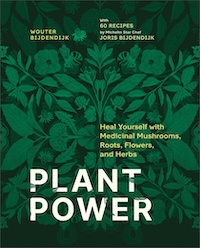Plant Power And Our Immune System
Heal yourself with medicinal mushrooms, roots, flowers and herbs.
Evolutionarily, plants are much older than animals, and therefore, humans. Plants have had to deal with natural pathogens such as fungi and bacterial for millennia, and during that time have learned to successfully defend themselves by producing natural bactericides and fungicides among other important substances. These defensive substances not only benefit plants, but humans as well, as we can use them for our own defense and other purposes.
People are living longer and longer, so we might expect them to be healthier. And yet the opposite is true.
A critical component of good health is our immune system, which is made up of an acquired and an innate part, and is present throughout our body. Relatively simple measures can strengthen our immune system, such as getting enough exercise, quitting smoking, sleeping well, getting enough rest, and eating healthily.
It is preferable to consume at least 25 different types of plant-based foods a week, including organic fruits and vegetables, herbs, nuts, seeds, and mushrooms; there are even studies showing that you should aim for a minimum of 30 different plant foods per week.1 A diet lacking in variety weakens the immune system.
The environment in which you live, your genetic predisposition, how you live, and what you eat play an important role in your health. It is important to know that these different factors interact, and that you can view your health holistically.
Training The Immune System
Our immune system is one of the fundamental pillars of our health. It is not only important for keeping harmful bacteria, viruses, fungi, and other microorganisms at bay but also for our overall health. I am very taken by immunologist Jenna Macciochi’s idea that we should see the immune system as a kind of sense that you can train, fine-tune, and boost as you can with your other senses.2 If you want to stay healthy, try to support it throughout your life.
As mentioned, exercise, good sleep, plenty of fresh air, varied organic food (including 300 grams/10.5 ounces of fresh plant-based foods each day, such as vegetables and fruits) and the use of beneficial plants and mushrooms are a good first step to boosting your immune system. Taking a cold shower has also been proven to improve our resistance.3 In Europe’s earliest hospitals, often in monasteries, the monestary garden was considered an essential part of the healing process.
Consuming plenty of omega-3 fatty acids (such as from walnuts) and specific plant substances such as polyphenols has a positive effect on our immune system. Polyphenols have an anti-inflammatory and anticarcinogenic effect and protect the body’s cells against free radicals. Well-known examples are anthocyanins from wild blueberries, blackcurrants, and raspberries; sulforaphane from broccoli; resveratrol from grapes; ECGC from green tea and matcha; vitamins A, C, and E; fiber; and probiotics.
Fiber, in particular, feeds the good bacteria in your intestines and is essential for healthy gut flora — there may be a relationship between imbalanced gut flora and obesity, depression, Alzheimer’s disease, and allergies. Most of your immune system is, in fact, located in your gut. As Swiss physician Alfred Vogel put it, “Death sits in the intestines.” 4
Most Of Your Immune System Is Located In Your Gut
Indeed, diseases often enter our bodies through the intestines, so it is extremely important to maintain good gut flora. Being conscious of what you put in your body, what you eat and drink, and the effects of diet on your health and resistance is essential. Billions of bacteria and viruses live in our intestines, most of which we need and are beneficial. A well-functioning immune system recognizes the good microbes and leaves them alone, while malicious intruders are blocked or dealt with.
Diseases often enter our bodies through the intestines, so it is extremely important to maintain good gut flora.
In fact, our immune system attacks anything that looks genetically different from us and, moreover, it has a “memory.” If we experience a great deal of stress, take certain medications, and consume excess alcohol, a pathogen is more likely to be able to penetrate the intestinal mucosa. Our bodies also perceive extreme sport as stress, which means that insufficient energy goes to the core of resistance, our intestines.5
The good bacteria even pass on information to our immune system about new, still unknown microbes. Our brains and intestines are strongly connected. For example, 95 percent of the “happiness hormone” serotonin is produced in the intestines. It is also important to train your immune system and not spend all your time in a sterile environment. This works in the same way as vaccines, which are designed to trigger an immune response, thus protecting us against future exposure to certain diseases.
The Good And Bad Of Inflammation
Many diseases are caused by inflammation. When your immune system is functioning well, it detects inflammation and clears it. Inflammation is an immune response that is crucial for our health but primarily intended as an acute short-term attack. If your immune system is not functioning properly, inflammation can become chronic, severe, and cause diseases.
One of the causes of inflammation is bacteria. Many people are frightened by the word bacteria, yet we live symbiotically with many bacteria that actually help us. In our intestines, especially, there are billions of bacteria that we should see as allies; our body is essentially an ecosystem with many different inhabitants. In fact, 99 percent of the bacteria that surround us at any given moment do not cause disease.6
Most people who are given antibiotics for a urinary tract infection, for example, do not realize that these will also kill the good bacteria in their gut. Although antibiotics are fantastic medicines that have saved millions of lives, you have to be careful with them. Using them too often weakens your overall immune system (especially in your intestines), making you much more susceptible to a flu virus, for example.
One of the disadvantages of a large number of chemical antibiotics is the long-term side effects. They also destroy the natural balance in our intestines by killing the good bacteria along with the bad, weakening our resistance in the process. This is something we have only lately come to realize, as the long-term dangers were not previously known. If it is medically necessary to go on a course of antibiotics, it is important to simultaneously supplement with high-quality probiotics and prebiotics to replace any beneficial bacteria that are lost.
Your immune system uses short-lived but powerful inflammation to eliminate pathogens. It is used for defense; however, under certain circumstances, temporary inflammation can become chronic and weaken your immune system. On the other hand, you can also overstrain your immune system, allowing an allergy or autoimmune disease to develop, essentially an overreaction. Many people experience chronic inflammation that may not be evident but causes damage. You can do a great deal to prevent and counteract chronic inflammation, starting with adjusting your diet to include more antioxidants from fruits and vegetables.
A Simple Way To Reduce Inflammation
Many people are deficient in nutrients because their diet is too limited and thus, lacks trace elements, minerals, vitamins, antioxidants, and other beneficial plant compounds, as well as good fats and enough healthy protein. As you probably already know, eating junk food, such as industrially processed and refined products, is the first thing that destroys our immune defenses. The “Standard American Diet” (SAD) is considered one of the unhealthiest in the world by physician and researcher Kris Verburgh, and many agree with this.
You can do a great deal to prevent and counteract chronic inflammation, starting with adjusting your diet to include more antioxidants from fruits and vegetables.
Verburgh believes that the body’s own antioxidants, which are thousands of times better at neutralizing free radicals than antioxidant supplements, need the mineral selenium in order to function properly, as is the case with many of the immune system’s proteins.7 Most Europeans and Americans do not get enough selenium, as soil in Europe and many parts of the United States of America is depleted of this mineral. Seafood, such as oysters, is high in selenium, as are some types of nuts and seeds.
One of the richest natural sources of selenium is Brazil nuts, with each nut containing 60–90 micrograms of selenium. Although it is essential, too much selenium is unhealthy, so don’t eat Brazil nuts every day; instead, aim for no more than a few a week.8 Nettles and spirulina also contain selenium.
When it comes down to it, you do not have to get too worked up about taking extra nutritional supplements if you eat a diet containing a variety of organic foods. However, since many people lack minerals, it may be a good idea to take an all-natural mineral supplement.
One special mineral source is shilajit, also known as the “sweat or tears of Himalaya.” It comes from prehistoric plant material released from the rocks of the Himalayan Mountains by pressure and from the heat of the sun. It’s also found in other places like the Altai mountains of Mongolia, and sometimes called mumijo in its purest form.
Akin to ancient tar, it is a natural extract from the primeval forest that existed here millions of years ago. Shilajit is a complex natural mix of at least 85 minerals, five of which do not occur in natural form in any other substance on Earth. In Indian Ayurvedic medicine, shilajit is considered a rasayana (“path of essence” in Pali or Sanskrit), a substance that helps boost our strength, immunity, and vitality. Sanskrit scriptures that are 3,000 years old already mention shilajit as a “destroyer of weakness.”
NOTES
- E.J Carr et al, The Cellular Composition of the Human Immune System Is Shaped by Age and Cohabition (2016). 461–468.
- J. Macciochi, The Power of Immunity: Why Some People Are Never Sick (and Others Correctly) (2020).
- G.A. Buijze et al, The Effect of Cold Showering On Health and Work: A Randomized Controlled Trial (2016).
- Author fieldwork in Suriname.
- Vitamin Times:Work on Resistance, vol. 21, no. 3:6. Original source: healthcare.nu/wageningen.
- Macciochi, The Power of Immunity, 47.
- K.Verburgh, Slowing Down Aging: The Longer Young Plan (2016).
- Verburgh, Slowing Down Aging, 170.
Excerpt from Plant Power: Heal Yourself with Medicinal Mushrooms, Roots, Flowers and Herbs by Wouter Bijdendijk and Joris Bijdendijk, published by Inner Traditions International and Bear & Company, © 2025. All rights reserved. This healing and culinary treasury with stunning photography features 30 beneficial plants and mushrooms, with two delicious vegetarian recipes for each from Michelan Star chef Joris Bijdendik to incorporate their medicinal qualities into your daily life. www.Innertraditions.com. Reprinted with permission of publisher.
Wouter Bijdendijk is an anthropologist specializing in ethnobotany and pharmacognosy with a degree from Amsterdam University. Over 20 years of touring the world, he has studied herbal medicine in different traditions. Chef and author Joris Bijdendijk achieved 3 Michelin stars within 8 years of starting his career. He is the chef of the restaurant RIJKS® at the Rijksmuseum and, in 2019, opened the restaurant Wils in Amsterdam.
Find holistic Herbs & Herbalists in the Spirit of Change online Alternative Health Directory.
RELATED ARTICLES:
Nature’s 9 Most Powerful Medicinal Plants And The Science Behind Them
Answers To The 10 Most Frequently Asked Questions About A Plant-Based Diet












